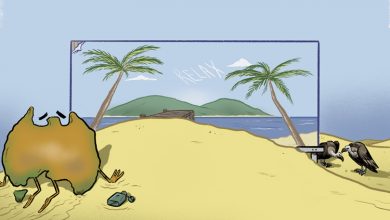The expression ‘dark site’ conjures images of shady figures perpetrating unregulated evils.
But for one enterprising astrologer, it represents a chance to shine a light on the brilliant desert night sky and bring tourists from all over the world to Outback Australia.
Andrew Fitzgerald, an amateur astronomer, wants to turn the outback an international dark sky reserve.
The Outback’s natural environment, from the red desert to the rock formations of Uluru and the MacDonnell Ranges, is already an international tourist draw.
But its lack of population, humidity and general and light pollution combine to also make the remote geographical location ideal for studying stars.
While Andrew agrees the Outback is already very dark at night, the designation would mean an extra effort to minimise artificial light from getting into the sky.
“It’s specifically reclaimed area for astronomical observing, so that there’s all these light ordinances and regulations which controls how light is managed,” he said.
“We have arguably some of the best sky in the world possibly with the exception of some of the high mountain areas.”
Websites including darksitefinder.com and darksky.org alert stargazers all over the world to dark sites, where conditions allow opportunities to see details not visible in cities or populated areas.
“It allows you to see sort of fainter details, so particularly things like the Milky Way,” said Andrew.
“It also has an effect called the zodiacal light, it’s a faint light on the ecliptic plane. We see that quite well here.
“So you get things like dark nebulae which are gas and dust clouds in space which are not lit by stars and are just like a black silhouette.
“You need really, really dark and good clarity conditions to see those. And here we see that incredibly well.”
There are already 12 international dark sky reserve sites including Aoraki Mackenzie in New Zealand, Snowdonia National Park in the United Kingdom, and NamibRand Nature Reserve in Namibia.
The International Dark Sky Association rules on applications, with sites required to be at least 700 square kilometres and applications to include an extensive lightscape management plan in order to be considered for official accreditation.
A spokesperson for the Northern Territory government says there are no current plans to develop a reserve but the state does support the astro-tourism proposal.
“While we don’t have any official reserves per se, anywhere further out than 10 kilometres from Alice Springs is an astronomers dream, in fact, the Northern Territory is well known among astrological groups for this, without the need for any new reserves,” a spokesperson said.
“If there was interest from operators, this is something that could be considered further.”
Andrew said the perfect location for an international dark sky reserve would incorporate an existing tourist site in either the East or West MacDonnell Ranges either side of Alice Springs.

AccomNews is not affiliated with any government agency, body or political party. We are an independently owned, family-operated magazine.





